This article is more than 5 years old.
This March I attended The Collective 2018 gathering in Knoxville, TN. This is the 4th annual Collective gathering, a relatively new non-profit professional organization that aims to “disrupt, reinvent, and redefine” the professional library conference through a model of active learning, collaboration, and practitioner-focused content. The theme for this year’s meeting was “The Library as Test Kitchen“, and I was very pleased with the sessions, my take-aways, and the overall coordination + general vibe of this conference! Here are some of my highlights:
This Librarian Life: Storytelling with Podcasting & Audio Production
Jason Evans Groth, NC State University
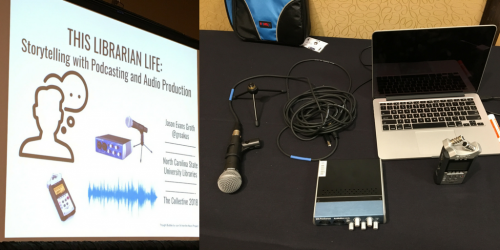
Who doesn’t love a good podcast? During this session, Jason Evans Groth (Digital Media Librarian at NC State) gave an overview of how podcasts/audio production can become a valuable tool in sharing our stories with (and demonstrating our value to) our community. Recommended podcasting tools were shared and useful tips for planning/production were also covered, such as:
- Have a podcast plan! Use storyboarding to organize content/assets
- Capture the voices of the people involved
- Use the “podcasting clock” composition style = “the rules”; “the argument”; “the evidence”; “the point”
- Keep your stuff organized! Consciously manage data files and file name conventions
- Use music to set the mood, apply transitions, create pauses
- Don’t be afraid of your own voice (it’s called phonophobia + everyone suffers from it!)
- Talk into the microphone with confidence (don’t let phonophobia win!)
At the end of the session, we broke off into small groups and worked together to create a short audio clip using Garage Band (+ an iPad). It was fun, relatively easy, and definitely something I could see incorporating into our communications repertoire! NYPL, GA Tech Libraries and several other librarians are creating podcasts to share their stories.
Taking Stock: Conducting an Engagement Inventory
Michael Peper, University of Kansas & Emily Frigo, Grand Valley State University
Michael and Emily opened the session by discussing new metrics for academic library engagement across campus (referencing the Gibson and Dixon model, Jose Diaz, social network analysis/mapping). Then we worked in small groups and discussed specific details related to how we are currently measuring/recording library engagement across campus, how we are measuring impact, and what challenges do we face in measuring/recording engagment (notes from each of the small groups were compiled and can be found here). I ❤ the idea of mapping a library’s engagement across a community– not just to have a visual representation of impact, but also to help identify potential gaps/opportunities for engagement.
Way Outside My Wheelhouse: Academic Librarians Respond to Crisis
Paula Archey, Jeremy Boggs, Abby Flanigan, Maggie Nunley, Erin Pappas, University of Virginia
The session description hooked me in– “Administrative chaos, sexual assault, active shooters, nazi marches, student suicide – we’re dealing with some things these days. And there are a lot of questions. What can librarians do when our communities are in crisis? Should we respond, and what should that response look like? What can we do to create, and support, change?”
This session focused on crisis prep/response and was led by 5 librarians from the University of Virginia. They shared their reflections on recent campus crises at UVA that received national attention (UVA President’s resignation & reinstatement in 2011, Rolling Stone article in 2014, ‘Unite the Right Rally‘ in 2017). It was a valuable opportunity to learn from other librarians, share ideas and lessons learned, and consider ways to support our community beyond a traditional role.
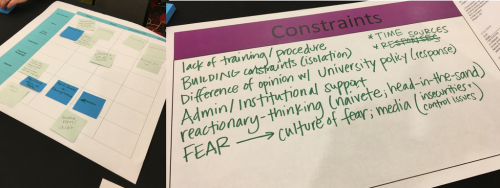
For the session activity, we broke up into small groups (organized by type of institution) to brainstorm constructive planning and responses to a hypothetical crisis. I was in a group with other librarians from small, liberal arts institutions and one of the librarians shared a recent change in their campus weapons policy to allow concealed carry permits (firearms) on campus. We used this real-life situation to brainstorm/map a response to gun violence on campus. Using a Crisis Response Matrix, our group planned constructive preparation, active response and post responses to our hypothetical crisis. Key themes that appeared across most of the small groups response matrices included: developing proactive policy & procedures; effective communication; empowering faculty/staff response through training; performing audits to improve experiences; alignment with campus policies/procedures.
For me, one of the most important questions asked during this session was “in the aftermath, how can we [the library] support students and heal as a community?” There is definitely an emotional labour piece involved in crisis response that is not usually considered in planning or even in the immediate aftermath. In an effort to both document and cultivate conversations around the Aug. 12th ‘Unite the Right’ rally and counter protests, UVA Library is currently soliciting donations to build a digital archive.
The Great News Fake-Off: Fighting Fake News and Misinformation in the Library
Sarah Morris, Nucleus Learning Network
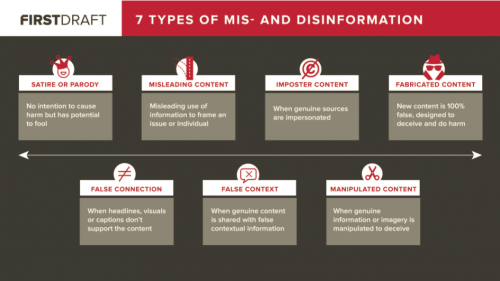
During this session, attendees shared instruction experiences and professional reflections related to the current misinformation crisis. We worked together in small groups to dissect and unpack digital literacy curriculum. Lots of great resources were shared during this session to help supplement/develop instruction sessions (presentation slides)!
- First Draft (a project of the Harvard Kennedy School’s Shorenstein Center)
- Mozilla’s Internet Health & Web Literacy
- Mission:Information Teaching Kit (Nucleus Learning Network)
- #gifhistory (Matthew T’Cherry, @MatthewACherry)
- X-Ray Goggles (Mozilla)
Some additional tips for addressing fake news & misinformation in instruction:
- tie in mindfulness
- provide real life examples (what are the consequences for NOT fact checking)
- work with faculty to pull additional resources (what are some alternatives to frequently used sources)
- incorporate humor! Don’t let things get too tense 🙂
Other Fun Things @ The Collective:
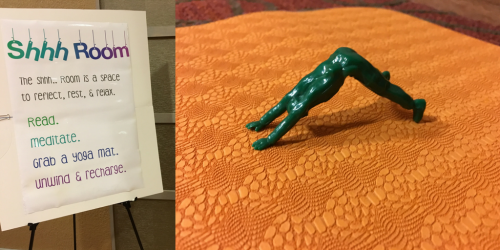
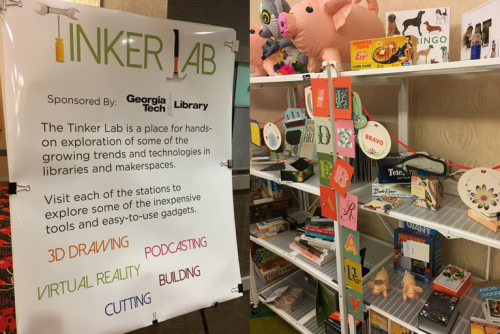
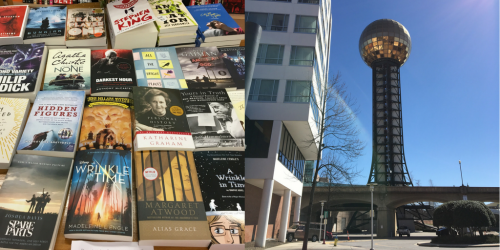

11 Comments on ‘Meghan at The Collective’
I’ve always been curious about that conference. Thanks for sharing!
Fascinating and inspiring!
Love all the ideas!
Thank you so much for sharing this!! Sounds like the most creative library conference ever.
I really enjoyed the podcasting info and the fake news info! This sounds like a great conference! Thanks for sharing your experience! (It makes me want to attend the next one!)
Great report, Meghan! I especially enjoyed the section about podcasting!
Thanks for this report on such an interesting conference, Meghan! I look forward to hearing more about your ideas for a podcasting assignment!
So much info, I feel like I was there!
The Tinker Lab sounds like fun! That’s neat that GaTech sponsored it on-site.
The engagement inventory sounds very interesting! Thanks for such an info-filled report.
Wow, so much hands-on learning, glad to hear of this unusual conference.